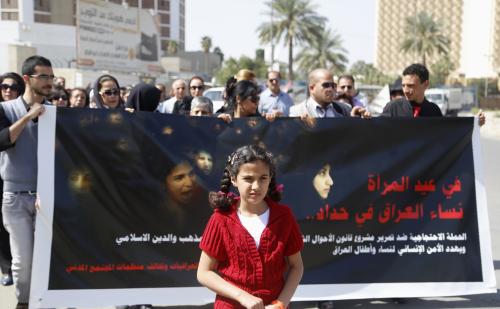STEVE INSKEEP, host: President Bush is giving a series of speeches just before the war’s third anniversary. President GEORGE W. BUSH: Amid the daily news of car bombs and kidnappings and brutal killings, I can understand why many of our fellow citizens are now wondering if the entire mission was worth it. I strongly believe our country is better off with Saddam Hussein out of power.
INSKEEP: The President spoke in his weekend radio address.
Today President Bush speaks about training Iraqi security forces. And this morning we’ve called Michael O’Hanlon, a Senior Fellow with the Brookings Institution.
Michael, good morning.
Mr. MICHAEL O’HANLON (Senior Fellow, Brookings Institution): Hi, Steve.
INSKEEP: So this is the second time in recent months the President’s given a round of speeches about the war. The last round ended in December, what has changed sense then?
Mr. O’HANLON: Well, unfortunately it has not been a great winter. I think it’s the only fair way to sum it up. Of course there’s a lot going on in Iraq and there are some hopeful things. But if you look at the winter overall, while U.S. troop fatalities have declined a little bit, it’s still obviously been a very violent period with a growing risk of some greater sectarian violence. And on top of that of course the political system has essentially ground to a halt, and the economy has not really made much progress. So I think if you have to sum it up, despite the hopeful signs here and there, it has not been a great three months and that’s perhaps why the President feels he has to go back to this same approach of giving speeches to the country.
INSKEEP: Michael, I’m on the Washington Post website this morning reading an article out of Iraq by Ellen Nickmeyer, their correspondent who has done so much work there, and she writes, The past two weeks have changed the war in Iraq, shifting its focus from a U.S. driven fight against Sunni insurgence to a direct battle for power and survival between Shiites and Sunnis.
What does that change mean for the United States?
Mr. O’HANLON: Well, first of all, she’s a very good reporter, and I think she’s summed it up dramatically. I’m not sure it’s quite that radical of a change because there certainly remains a strong insurgency with the same goals as before, and there was always the risk of sectarian violence previously. Of course, we’ve heard some American officials say that if this becomes a civil war, which still seems unlikely, as long as the political leadership in Iraq works in unison against it, we would probably try not to take sides. We don’t have a particular interest in getting our troops between different units in the Iraqi forces or in the Iraqi militias that are firing at each other.
On the other hand, standing aside sounds better than it really would be, because if you really stand aside, you’re allowing the kind of violence that we saw in the last three weeks, potentially on a much greater scale. So frankly, I don’t think we’ve really heard a good answer yet to what the U.S. would do if we got the worst case here.
INSKEEP: If there was the worst case, are Iraq’s security forces up to defending the country, or do we even know what side they’d be fighting on?
Mr. O’HANLON: No, that’s the problem, because the Iraqi security forces have made a lot of progress in terms of their technical proficiency, but we don’t know much yet about their political dependability, and the assumption has to be that it’s greater toward their individual ethnic groups right now than to the nation as a whole, for the simple reason that most of the units are primarily one ethnic group or another, and of course we’re seeing this kind of violence.
Now, the good news is that the security forces have not typically taken sides. They may have stood by when they should have intervened, but that’s the worst they’ve done, and that is hopeful. But if you do want to presume a civil war, or the assumption that it’s somehow begun, I think it would be tough to assume the Iraqi security forces would be able to stamp it out.
INSKEEP: When you talk, as I know you do, to American military commanders, do they honestly think, when they speak privately, that they have a better sense of how to defeat the insurgency itself, than they did a year ago, say?
Mr. O’HANLON: No, because they still know, and they’re very correct in making this argument, that we need a political solution to this, first and foremost, which is true in any counter-insurgency, and today we are, unfortunately, no closer to that political solution, and it’s been three slow, frustrating months on the political front, despite the excellent efforts of Ambassador Khalilzad. So without the Iraqis working together to project a strong political message that different ethnic groups can all buy into, I think we have no particular reason to expect things to get better.
INSKEEP: So we have to wait for some kind of government of national unity, if one does appear?
Mr. O’HANLON: And yet waiting by itself means that we’re not accomplishing what we need to; waiting is not a good thing. Time is not on our side as long as the stalemate continues.
INSKEEP: Michael, thanks very much.
Mr. O’HANLON: Thank you, Steve.
INSKEEP: Michael O’Hanlon is a senior fellow at the Brookings Institution.



Commentary
Bush Addresses War in Iraq with Speeches
March 13, 2006